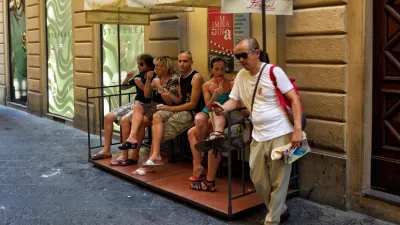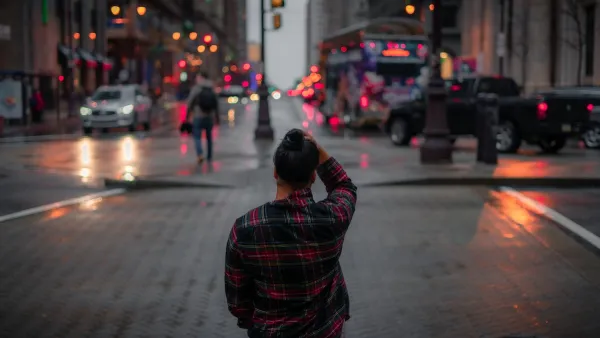Supported by imagery of human urban conduct, Chuck Wolfe argues that walkable is good, but sit-able is better—and that "it’s time for the next big focal point and the next big idea, the 'Sit-able City'."

Drawing on the tradition of observers of urban, human conduct, Wolfe suggests that complementing the "walkable" with a more purposeful focus on the "sit-able" would lead to a more holistic and enhanced understanding of place, over and above implementation of pop-up and tactical urbanism tools:
[S]it-able places are key, interdisciplinary focal points where the delight of “placemaking” and cultural traditions of “watching the world go by” merge with the sometimes conflicting domains of law and politics, economic development, public safety, gentrification and the homeless.
Noting how perceptions of public safety, "sit and lie" ordinances, and related social justice issues are often at the center of political and downtown revitalization debates, Wolfe concludes:
[A] greater focus on the sit-able is an invitation to rich discussion and ready illustration based on human tradition... A focus on “sit-abilty” could be a game-changer, and encourage a richer conversation about why, ironically, we sometimes have second thoughts about a rest stop in the reinvented, walkable cities of today.
FULL STORY: why the "sit-able city" is the next big idea

Analysis: Cybertruck Fatality Rate Far Exceeds That of Ford Pinto
The Tesla Cybertruck was recalled seven times last year.

National Parks Layoffs Will Cause Communities to Lose Billions
Thousands of essential park workers were laid off this week, just before the busy spring break season.

Retro-silient?: America’s First “Eco-burb,” The Woodlands Turns 50
A master-planned community north of Houston offers lessons on green infrastructure and resilient design, but falls short of its founder’s lofty affordability and walkability goals.

Test News Post 1
This is a summary

Analysis: Cybertruck Fatality Rate Far Exceeds That of Ford Pinto
The Tesla Cybertruck was recalled seven times last year.

Test News Headline 46
Test for the image on the front page.
Urban Design for Planners 1: Software Tools
This six-course series explores essential urban design concepts using open source software and equips planners with the tools they need to participate fully in the urban design process.
Planning for Universal Design
Learn the tools for implementing Universal Design in planning regulations.
EMC Planning Group, Inc.
Planetizen
Planetizen
Mpact (formerly Rail~Volution)
Great Falls Development Authority, Inc.
HUDs Office of Policy Development and Research
NYU Wagner Graduate School of Public Service



























